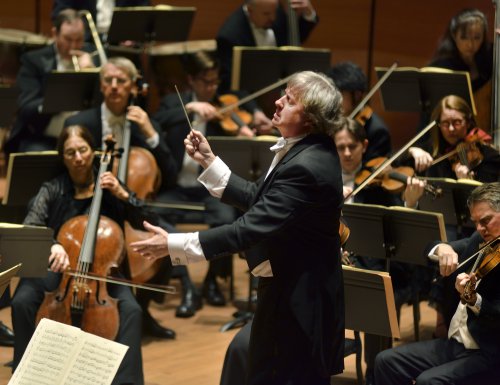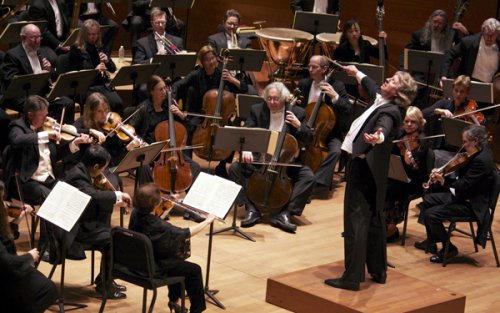American Classical Orchestra: “As the Masters Heard It, Music by Beethoven, Mozart and Schubert”
A splendid evening of late eighteenth and very early nineteenth century masterpieces, played on periodic instruments and sounding absolutely new.
[avatar user=”Jean Ballard Terepka” size=”96″ align=”left” ] Jean Ballard Terepka, Music Critic[/avatar] 2014-2015 is the American Classical Orchestra’s thirtieth anniversary season and this mid-March concert at Alice Tully Hall continued the season’s high standards of both musical excellence and clearly joyful engagement in all aspects of the music being performed. Music Director and Founder Thomas Crawford, conducting the whole concert without any scores, embodied disciplined musicianship on the one hand and unfettered, unabashed pleasure in the music on the other.
The pieces chosen by Crawford for this concert represented the very best of the Viennese Classical period: each piece in the evening’s repertoire was a unique marriage of deep drama and expansive beauty. On this evening, the particular mission of the American Classical Orchestra – to play European masterpieces of orchestral music on period instruments – was brilliantly clear in both purpose and effect. Designed to enable audiences to hear what composers, their musicians and their audiences actually heard two or three centuries ago, this orchestra transported contemporary audiences back in time, revealing what the edginess and innovation of the past first sounded like. One happy consequence of this mission in Crawford’s hand is the debunking of the twin notions that music of the past can be made more exciting with modern instruments and that composers of the past would necessarily choose modern instruments because the futurity of their vision would be enhanced by instruments of the future.
In fact, the genius of composers such as Mozart, Beethoven and Schubert is clearer with the use of instruments of their own era. In the case of the Schubert and Beethoven especially, the orchestral sound is reedier, and therefore more pastoral, even sylvan, with period instruments than it is with “modern” orchestras; the wildness, daring and, in fact, modernity of the music is more evident.
The concert opened with Beethoven’s 1809-1810 Overture to “Egmont,” a relatively short work containing a whole macrocosm of personal and human drama. Written as one of several pieces of incidental music for Goethe’s play Egmont, this overture, built on crescendos of chiaroscuro contrasts, explores themes of defeat and victory as well as personal sacrifice for a nationalist triumph. It is stirring and exhilarating piece, performed brilliantly on this evening.
Next on the program came Mozart’s familiar and well-loved Mass in C major, often called the Coronation Mass, with its stunning combinations of magisterial authority and intimate communions of personal and ecclesiastical connections to God. The orchestra and chorus both responded to the loving passion of Crawford’s conducting with performances of clarity, nuance, subtle dimension and great heart. The soloists – soprano Sherezade Panthaki, alto Sarah Nelson Craft, tenor Marc Molomot and baritone Michael Kelly – gave musically fine and psychologically full performances, but the Mass, on this cuttingly cold afternoon belonged to Panthaki.
Panthaki’s voice, more operatic in tone and strategy than that of her three colleagues, is capable of both huge, rich volume and sensuous delicacy; her upper register is unstrained and lyrical. Her “Agnus Dei” was a marvel: her “Miserere” was tenderly, passionately felt, half womanly and half seraphic, and her nearly improvisational pacing and ornamentation, to which Crawford was perfectly attuned, resulted in a gorgeous prayer that was not just Panthaki’s, but ours as well.
Immediately after the intermission, the chorus performed Beethoven’s “Welten singen Dank und Ehre” from his 1803 oratorio, Christus am Olberge. Just before they began, Crawford addressed the audience – as familiarly and informally as he might a group of friends in his living room or students in a classroom – to say that the four minute piece was really just an excuse for a choral encore … and a fine encore it was.
The program closed with Schubert’s gorgeous Symphony No. 9 in C major. Crawford did not shy away from the high-speed daring of this complex work; his happy boldness elicited the very best from the orchestra.
The success of this concert was solid; the “star” of the evening was not so much the commitment to perform with period instruments but the music itself … thereby vindicating the American Classical Orchestra’s core mission, and Crawford’s.
American Classical Orchestra: “Music as the Masters Heard It, Music by Beethoven, Mozart and Schubert” (March 12, 2015)
Alice Tully Hall, 1941 Broadway at 65th Street, in Manhattan
For tickets or information, call 212-362-2727 or visit http://www.ACOnyc.org
Running time: two hours including one intermission








Leave a comment